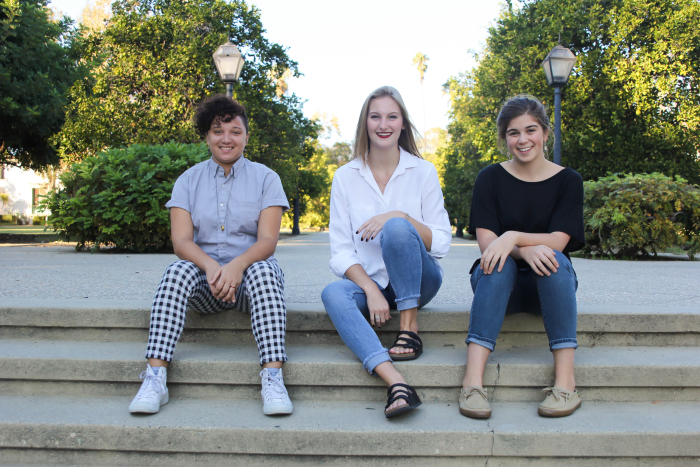Scripps College has nominated Madeline Moulton ’16, Vivienne Muller ’16, and Haley Wilhelm ’16 as finalists to compete for prestigious Thomas J. Watson Fellowships. They, along with hundreds of graduating seniors from across the U.S., will be in the running for these fellowships, which are awarded annually to 50 students from approximately 40 colleges. The fellowships support independent study and research projects that have international focus. The Scripps finalists have proposed projects around art and science, dance, and agriculture.
Moulton, Muller, and Wilhelm were nominated by a selection committee comprising Roberto Pedace, associate professor of economics; Susan Rankaitis, Fletcher Jones Chair in Studio Art; Warren Liu, associate professor of English; and Sumita Pahwa, assistant professor of politics. Pedace, chair of the committee, said that this year’s applications touched upon a wide variety of academic fields and were especially interdisciplinary. “The projects proposed by this year’s nominees are among some of the most diverse, in terms of interests, we have seen. They also combine areas of inquiry in ways that we don’t often see.”
Moulton, a physics major and art minor from Eugene, Oregon, proposed a project called “My Sky Worship Sketchbook: Exploring Interactions Between Astronomy and Art.” Moulton is interested in how humans connect and interact with the universe, particularly through art and culture. Her proposal has her traveling to Chile, Ireland, Switzerland, Australia, and India in order to “explore sky worship in both ancient and contemporary approaches, connect with amateur astronomers, artists, scientists, astrologers, environmental conservationists, and other sky lovers, and make drawings and paintings of humans interacting with the sky.”
For Moulton, the application process involved “many, many hours of research, writing, drafting and editing,” as well advice from her friends, family, and faculty. Moulton is thrilled to be a finalist, and acknowledges the strength of her peers’ proposals. “I know there were many great applications, and I feel very lucky to have made it to this next step. All of the time spent thinking about and working on this project and preparing for interviews was well worth it.”
Vivienne Muller, a history and Latin American studies major and dance minor from San José, California, designed a project entitled “Dancing the African Diaspora.” As someone who has had a lifelong passion for dance, Muller is excited at the prospect of participating in and exploring dance across different cultures. In traveling to Mozambique, India, and Brazil, Muller plans to “use dance as a lens to look at gender in relation to self-definition in African Diasporic countries” and “explore dance in a variety of spaces, including performance, ritual/traditional and social.” In regard to the application process, Muller found it to be unlike any other process she has gone through, stating, “It involved a significant amount of creativity, honesty and rawness. The unique thing about Watson is that they really want to know who you are as a person.” Muller summed up her feelings about being a finalist, stating “I feel awesome.”
Haley Wilhelm, a politics and international relations major and German studies minor from Elwood, Indiana, created a project named “Alternative Forms of Agriculture.” In her studies at Scripps, Wilhelm discovered an interest in sustainable and alternative agriculture, as well as in Food Policy, or “the ways in which government policies affect the food sector.”
Wilhelm plans to delve into these interests in Argentina, Austria, Belgium, New Zealand, and Zimbabwe, during which she will look at a process called seed saving. “I will explore communities around the world founding their practices on the principle of seed saving—a practice embodying sustainability, biodiversity, and community. If chosen as a Watson, I will travel to seed saving institutes as well as work alongside farmers working toward sustainability and food sovereignty in rural communities.”
Wilhelm found that the application experience led her to a deeper understanding of her future goals. “I’ve definitely poured my heart and soul into my application, but it’s all for the better because I think I have an even clearer vision for my future, even if I am not chosen as a Watson Fellow.” Grateful to be a finalist, she states “This opportunity has provided me with a chance to synthesize all of my passions into one project. It’s a huge honor.”
Congratulations to Moulton, Muller, and Wilhelm for representing Scripps as finalists for the Thomas J. Watson Fellowship. After presentations of proposals to the Watson Foundation, the 48th class of Watson Fellows will be announced in the spring of 2016.


